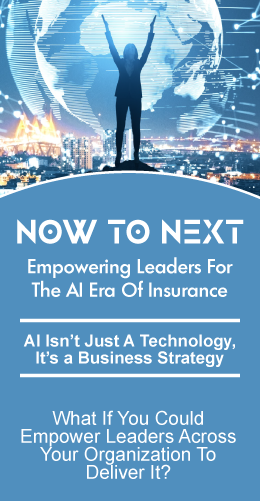
Over the past few years, businesses across all industries have been busy implementing digital strategies and fundamentally changing how they operate and deliver value to customers. As a sector, however, insurance has been slow to embrace digital transformation. Part of the problem is the interpretation of what ‘digital transformation’ really means.
I cannot tell you the number of times I have heard people say what they are doing is transformative, but far too often they are focused on implementing legacy processes with recent technology. While this ‘new’ digital technology may offer added functionality – the processes considered are often rooted in legacy thinking. (Think digital signature pads.)
“Executives are passionate and are fired up about digital transformation, but when they get right down to ‘what are we going to do,’ they often end up re-paving the cow path with the same experience.”
This is often caused by a reluctancy to break-away from legacy technology thinking. I have seen great ideas killed by not thinking outside of the box and trying to use the technology you have ‘lying around’ to take new products to market. If insurance carriers are set on using old technology thinking to be transformative, they are going to struggle. Monolithic ‘single-system’ thinking is going to move you quickly to 2010…… don’t get caught in that trap.
Position yourself with the right mindset
To enable digital transformation, the number one piece of advice I would give is to position yourself into a transformative mindset. The first thing you need is a strong leadership team and incredible talent; people who are brave enough to challenge existing ways of doing business.
Use the right metrics
As agents for transformation, they need to have the freedom to look beyond just sales as being the sole metric for measuring the value of digital transformation. This is not saying that sales are not important, but if this is the only metric used, other things will get left on the table – important things such as customer satisfaction and retention. You could be unknowingly hemorrhaging customers because you are not being transformative.
“These people need to be courageous; they need to be in an environment that is safe and will allow people try new things.”
Make sure you have a digital transformation plan
I cannot stress how important it is to have a plan – even one that changes repeatedly! But, if you do not have a base plan and you are not clear about what you are trying to do, then you will just get activity, without moving the needle.
My best advice is to put business strategy first before even thinking about technology solutions. As wrong as it sounds, leave technology off the agenda for the first couple of sessions. If you lead with technology, it will end up being in the driver’s seat and the irony is that it may just stop you from being truly transformative. Some of the most innovative ideas happen on the whiteboard before the tech is even brought into the conversation.
Advocate for a Customer-First Proposition
Start by mapping out the customer journey and then use the application to dynamically design how the process is going to work.
Out of this comes underwriting rules and questions and, by the time you have completed mapping questions, business rules and calculations, the product is built within the platform. Use interactive tools to design the product using the customer experience at the front and center.
Focus on speed to market and value. Those are game-changers. With today’s technology, new products scribbled on the whiteboard can be live in weeks. It is a break-away from the traditional insurance view that it takes 9, 12 or even 18 months to take a product to market. In fact, it involves taking a different mindset entirely – one that can test and learn and evolve products while they are in production.
Look for platforms and tools that reduce instead of add to technical debt. True SaaS based platforms, don’t require the installation of new servers nor the installation of software; neither do they become expensive to maintain since updates happen simultaneously with all clients at once. Today’s true SaaS architected platforms maintain a single version of the platform that is always live, and all clients are on that single version.
Check out INSTANDA’s latest downloadable report on insurance innovation. It explains how insurance carriers are benefitting from the freedom of bringing products to market at a much lower cost.
Think Sprints Rather Than a Marathon
The industry’s Achilles heel is that it has always had a long time to make changes and a lot of cash to spend. This is no longer the case. A decade from now, it is predicted that half of all named insurance companies will no longer exist in their current form. The ones that will remain will be digitally enabled.
My Challenge to Insurance Executives
Try and do things in smaller bites. Use truly transformative technologies to prove business concepts. If you think you have a marketable insurance idea, put it up in 4-6 weeks. Don’t feel as if you must have it all figured out before you give it to your customers – transformative cycles are what is truly going to make the changes.
It is time to change our thinking. Put the customer first, redesign the experience, then add the technology, so you can truly experience digital transformation. Be the company that will put you out of business. Be the future, now.
Greg Murphy, is EVP for INSTANDA North America.
No stranger to digital transformation, Greg was an INSTANDA client who left a high-profile strategy role to join the company.
To contact Greg, email Greg.Murphy@instanda.com
Visit our website to learn more.








